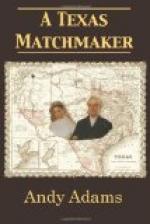The horse-breaking ended a few days before the appointed time. Las Palomas stood on the tiptoe of expectancy over the coming tourney. Even Miss Jean rode—having a gentle saddle horse caught up for her use, and taking daily rides about the ranch, to witness the practice, for she was as deeply interested as any of us in the forthcoming contests. Born to the soil of Texas, she was a horsewoman of no ordinary ability, and rode like a veteran. On the appointed day, Las Palomas was abandoned; even the Mexican contingent joining in the exodus for Shepherd’s, and only a few old servants remaining at the ranch. As usual, Miss Jean started by ambulance the afternoon before, taking along a horse for her own saddle. The white element and the vaqueros made an early start, driving a remuda of thirty loose horses, several of which were outlaws, and a bell mare. They were the picked horses of the ranch—those which we expected to use in the contests, and a change of mounts for the entire outfit on reaching the martial field. We had herded the horses the night before, and the vaqueros were halfway to the ferry when we overtook them. Uncle Lance was with us and in the height of his glory, in one breath bragging on Enrique and Pasquale, and admonishing and cautioning Theodore and myself in the next.
On nearing Shepherd’s, Uncle Lance preceded us, to hunt up the committee and enter a man from Las Palomas for each of the contests. The ground had been well chosen,—a large open bottom on the north side of the river and about a mile above the ferry. The lancing course was laid off; temporary corrals had been built, to hold about thirty range cattle for the roping, and an equal number of outlaw horses for the riding contests; at the upper end of the valley a half-mile circular racecourse had been staked off. Throwing our outlaws into the corral, and leaving the remuda in charge of two vaqueros, we galloped into Shepherd’s with the gathering crowd. From all indications this would be a red-letter day at the ferry, for the attendance drained a section of country fully a hundred miles in diameter. On the north from Campbellton on the Atascosa to San Patricio on the home river to the south, and from the Blanco on the east to well up the Frio and San Miguel on the west, horsemen were flocking by platoons. I did not know one man in twenty, but Deweese greeted them all as if they were near neighbors. Later in the morning, conveyances began to arrive from Oakville and near-by points, and the presence of women lent variety to the scene.




